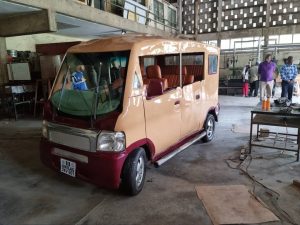
The University of Lagos is test-running its Zero Emission Vehicle (ZEV), an initiated constructed in 2018.

iBrandTV gathered that the UNILAG ZEV is a 63 per cent hardware and 100 per cent software home-made (Akoka content) mechatronics automobile device.
According to the institution’s Deputy Vice-Chancellor, (Academics and Research), Prof. Oluwole Familoni, the production is an invaluable addition to the university’s efforts at preventing release of toxic emissions to the environment.
He said that the initiative was also to encourage indigenous engineering innovation.
He noted that the Vice-Chancellor of the university, Prof. Oluwatoyin Ogundipe, had inaugurated the UNILAG Zero Emission Vehicle team in 2018.
The team is led by Prof. Samson Adeosun of the Department of Metallurgical and Materials Engineering.
He state that in line with the universal drive to minimise global warming, the vehicle was designed to eliminate carbon emissions associated with internal combustion engines, as well as minimise acoustic noise when in operation.
”In concept, the UNILAG ZEV team developed an adaptive and reprogrammable power train (drive) system.
”Although the drive train functionality is presently exhibited with six passenger Sport Utility Shuttle Van platform, it can be reconfigured to support 18-seater commuter bus.
”In its exhibition form, the drive train Energy Management System (EMS) is programmed to deliver ultra-low power supply to realise maximum range per battery charging cycle at campus shuttling speed of less than 20km//hour
”On highways, during intra or inter–city transits, the EMS is programmed to adaptively overwrite the shuttling mode and still minimise energy consumption.
”These user specific features are absent on assembled imported Completely Knocked Down (CKD) components of electric vehicles that have been reported in Nigeria to date,” Familoni.
He added that the UNILAG ZEV came with an on-board auxiliary power supply system.
The professor of chemistry said that the energy backup was available to the driver via a ‘please take me home switch’ on the dash board.
According to him, the vehicle runs on an improvised refurbished Nickel Hydride battery that delivers up to five-kilometre range per charging cycle when operated in Campus Shuttle mode.
”The range is extendable to 350km at optimum average speed of 110k/hour at highway mode, when appropriate lithium ion battery is installed.”
Commenting on the development, the Vice-Chancellor of the institution, Prof. Oluwatoyin Ogundipe, said that the product was a proof that the institution was neckdeep into demand-driving research.
He said that if given more support, the university would do more.
”We need more support for funding research,” he said.
Other members of the team that assembled the ZEV include Dr Akinfenwa Fashanu of the university’s Systems Engineering Department, Dr Mohammed Usman (Chemical Engineering) and Dr Adeola Balogun (Electrical and Electronics Engineering.

